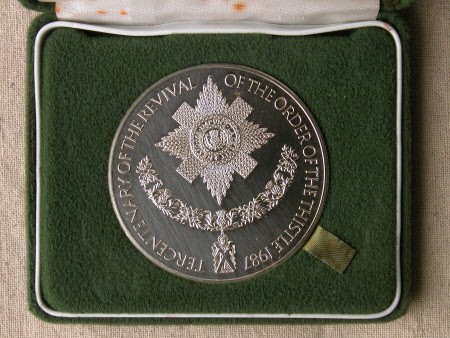Medal commemorating the tercentenary of the revival of the Order of the Thistle
The Royal Mint
Category
Coins and medals
Date
1987
Materials
Sterling (.925) silver
Measurements
63 mm (Diameter)
Place of origin
Llantrisant
Order this imageCollection
Osterley Park and House, London
NT 773332
Summary
Sterling silver, medal commemorating the tercentenary of the revival of the Order of the Thistle, by Jeffery Matthews and Robert Lowe, Royal Mint, Llantrisant, United Kingdom, 1987. A silver medal issued by the Royal Mint in 1987 to commemorate the Tercentenary of the revival of the Order of the Thistle, on 29 May 1687 by King James VII of Scotland (King James II of England). The Most Ancient and Most Noble Order of the Thistle is an ancient Order of Chivalry, the members of which are the Sovereign and sixteen knights, all of them people who have rendered exceptionally distinguished service on behalf of Scotland. The medal shows on the reverse the Breast Star and the Collar Badge of the Order of the Thistle and, on the obverse, the coat-of-arms of the Royal Mint. This example is number 384, from an edition of 1,000. It is in the original green leather-effect box, with the device of the Royal Mint on the inside of the lid. Also within the box is a printed card with the technical details of the issue, the certificate for no. 384 of the edition, and a description of the medal.
Full description
The Most Ancient and Most Noble Order of the Thistle is an Order of Chivalry associated with Scotland, which was revived by King James VII of Scotland in 1687. The Order’s members are the Sovereign and sixteen knights, all Scotsmen and -women notable for their outstanding achievements at home or abroad. Other members of the Royal Family are designated as Extra Knights and Ladies Companion. The Chapel of the Order is in St Giles High Kirk in Edinburgh. During the Queen’s annual residence at Holyroodhouse, a service is held, at which new Knights and Ladies are invested. The medal features on the reverse two of the main items from a Knight’s insignia. The first is the Breast Star of the Order, consisting of the St. Andrews Cross with rays emanating between the points. In the centre there is a Thistle surrounded by a circle upon which is the motto of the Order of the Thistle, ‘Nemo Me Impune Lacessit’ (‘No one provokes me with impunity’). The second item is the Collar Badge, which has a representation of St Andrew, Patron Saint of Scotland, bearing the Cross of his martyrdom and surrounded by a glory of rays, hanging from a collar with links formed of alternating representations of a single thistle and of a bunch of intertwined sprigs of rue. The obverse is a standard design used by the Royal Mint for commemorative medal issues during this period. It features the Armorial Bearings of the Royal Mint, as confirmed on 23 April 1982 by the College of Arms. The Arms incorporate devices from the personal arms of the five principal Officers of the Mint in 1561-62: Sir Edmund Peckham, High Treasurer, cross crosslets fitchée; Thomas Stanley, Under Treasurer, stags’ heads; John Bull, Comptroller, bulls’ heads; William Humfrey, Assaymaster, fleurs de lys; John Monnes, Provost of the Moneyers, the castles. Jeremy Warren 2019
Provenance
Given to the National Trust in 1993 by George Child Villiers, 9th Earl of Jersey (1910-1998).
Marks and inscriptions
Obverse, legend: ROYAL MINT. CENTENARY MEDAL. Reverse, legend: TERCENTENARY OF THE REVIVAL OF THE ORDER OF THE THISTLE 1987 Reverse, on Breast Star : NEMO. ME. IMPVNE. LACESSIT. Edge: Hallmark
Makers and roles
The Royal Mint, minter Jeffery Matthews, designer Robert Lowe, designer
